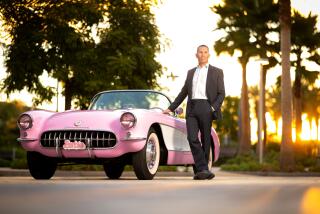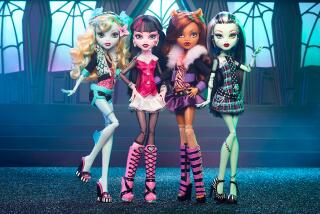Barbie, are you ready for man-bun or Dad-bod Ken?
Last year when El Segundo-based Mattel unveiled a bumper crop of new Barbies, including curvier, taller and more petite versions of its flagship fashion doll, one social media commenter quipped, “But what about #dadbod Ken?” referring to the perfectly chiseled abs and molded plastic hair of Ken Carson, Barbie’s longtime arm candy companion.
The other very tiny shoe drops today as Mattel starts selling a cornucopia of new Kens that includes two new body types dubbed “slim” and “broad” (the latter of which, with its slightly thicker middle, invites Dad-bod comparisons), six new molded hairstyles, including cornrows and an on-trend man bun, and seven skin tones.
It’s certainly not the first time the 56-year-old boyfriend of Barbie has switched up his look. (Who could forget 1993’s Magic Earring Ken?) However, it does mark the most diverse Ken squad to date. Mattel frames it as a natural progression, coming the year after the Barbie diversity push, but this is just as much, if not more so, a business decision for the toy company that’s been trying to turn around its core Barbie business.
Mattel doesn’t break out sales of Ken dolls but includes them in its overall Barbie sales.
Last year, after the new Barbies were added, the Barbie line’s sales rose 7% from the previous year, to $972 million. That accounted for 18% of Mattel’s total worldwide net sales of $5.46 billion.
But in this year’s first quarter — as Margo Georgiadis, a former Google executive, took over as Mattel’s chief executive — sales of Barbie and other Mattel merchandise suffered as retailers cleared out excess inventory left from the holiday season. The Barbie line’s sales alone dropped 13% from a year earlier to $123.4 million.
Having the new crop of Ken dolls is “definitely going to help,” said Jim Silver, chief executive and editor in chief of TTPM.com, a toy-review website. “I’m not going to say it’s a game changer, but is it a piece of the puzzle? Yes. The play pattern is that for every six to eight Barbies [a child] has, they generally have one Ken. So if you have a Ken kids aren’t interested in, that could affect sales. What’s happening needed to be done. They needed to do this. It’s the next step.”
But some Wall Street analysts said the Ken redesign was unlikely to have a significant effect on the doll’s popularity.
“Is it going to drive more sales? I doubt it,” said Keith Snyder, a stock analyst with the investment firm CFRA Research. “It’s not going to have a big impact on their financials.”
Linda Bolton Weiser, an analyst with the investment firm DA Davidson, likewise said the change mostly was “a regular marketing progression to modify your line.”
Mattel’s broader problems include competing with toys that have tie-ins with blockbuster movies, such as Hasbro Corp.’s “Star Wars” franchise, and youngsters shifting from conventional toys to mobile devices, video games and other electronics, Snyder said.
Like the various permutations of Barbie old and new, the latest additions are still doll-like, with longer legs and bigger heads than a scaled-down human. And because the body tweaks are compared against the original Ken silhouette, these changes are most noticeable when the dolls are standing next to each other.
In addition to a slightly larger — but still not big — belly, “broad” Ken’s arms are wider at the pecs and wrist, while “slim” Ken is more petit in both those areas, with the fluctuations in waistline most obvious when Ken is less than fully dressed.
Apart from the skin tones, which range from pasty Goth teen pale to dark brown (with sprinkle of freckles along the way), the most instantly noticeable change comes by way of Ken’s coif. The smart side-part styles that defined decades of classic Ken have been joined by close-cropped hairdos: the shaggy-on-top/faded-on-the-sides styles, fashionable cornrows and the love-it-or-hate-it hipster hairstyle, the man bun, with a molded button of hair at the back of Ken’s crown.
For what it’s worth, giving the classically handsome Ken a man bun makes him look like a miniature David Beckham. Also, one version of Ken comes with a pair of silver sunglasses, while another wears spectacles.
Although there aren’t any bearded Kens, bald Kens or tattoo-sporting Kens, that doesn’t mean there won’t be more Kens to come. “We want to do beards,” said Robert Best, senior director of Barbie Design. “Facial hair is definitely a thing. There’s going to be changes that we keep pushing, but you have to launch with something. It’s progress, not perfection.”
A total of 15 new and diverse Kens debut today, enough to form three tiny basketball teams, which brings up one obvious omission from the Ken lineup.
“We wanted to add a taller dude,” Best said. “That’s one signifier where you’re really able to see a difference. Height adds variety in a very visual way.”
The challenge , Best said, wasn’t vertical-height bias but merchandising. “It’s actually a stupid packaging/manufacturing limitation. Currently, we have to fit into store shelving, and shelving limits how tall we can go. That’s a real thing.”
For more musings on all things fashion and style, follow me at @ARTschorn.
Times staff writer James F. Peltz contributed to this report.
ALSO:
Mattel taps Google executive as new CEO
The 4,000 ways the new Barbie bodies fall short
Designer Phillip Lim opens a new L.A. store — and makes his first foray into film
UPDATES:
2:05 p.m.: This article was updated with quotes from Wall Street analysts and more details about Barbie’s and Mattel’s finances.
This article was originally published at 5 a.m.







